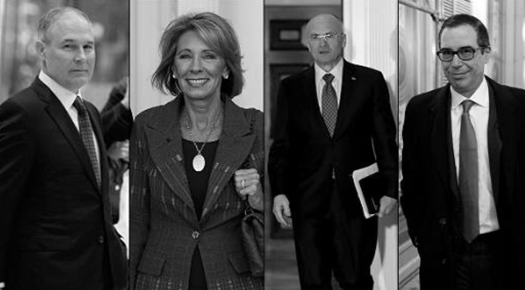
Since Donald Trump’s election, there are many uncertainties regarding almost all important issues. His policies, attitudes and ideology are described by scholars and commentators as populist, protectionist and nationalist. Trump advocates a non-interventionist approach to foreign policy, increased military spending, a focus on counteracting Islamic terrorism and aggressive military action against ISIS. On the other side, there are many questions about his stance towards the environment, the advancement of science, and teaching standards.
Many of Donald Trump’s cabinet picks are evangelical Christians, such as Scott Pruitt, who is a climate-change denier. Vice-president elect Mike Pence and Dr. Ben Carson, Trump’s pick to head the Department of Housing and Urban Development, are both evangelical Christians and known creationists who adhere to the biblically-supported belief that the Earth is only 6,000 years old. Another cause of concern, critics say, is the appointment of Betsy DeVos, also an evangelical, to head the Department of Education.
Pruitt, who is Oklahoma’s attorney general, wrote with his co-author Luther Strange, “Scientists continue to disagree about the degree and extent of global warming and its connection to the actions of mankind. That debate should be encouraged — in classrooms, public forums, and the halls of Congress.” Scott Pruitt has a record of opposing marriage equality, transgender bathroom access and abortion, and opposed a church-state separation ballot initiative on the Oklahoma ballot earlier this year. He was also a subject of a “secretive alliance” between Republican attorneys general and the oil industry.
Trump’s choice of Betsy DeVos for education secretary is just one more source of concern. DeVos is a champion of school vouchers, a program to send public money to religious or private schools. She and her husband, Dick DeVos, have framed their support for vouchers in terms of “advance(ing) God’s kingdom.” During his campaign, back in 2006, Dick DeVos, Betsy’s husband, said school districts should be able to teach the idea that a higher power created life on earth. Intelligent Design and creationism have almost no support from mainstream scientists.
The tone of Donald Trump’s campaign has made many educators and academics worried about the future of liberal arts and STEM (science, technology, engineering and math) education. Quincy Brown, program director for STEM Education Research at the American Association for the Advancement of Science cited President Barack Obama’s 2011 initiative to train 100,000 new STEM teachers. “These kinds of initiatives motivate the educational community,” Brown told Scientific American. “If messages like that are not coming from the top, I wonder whether there will be a shift in priorities.”
The U.S. Constitution does not grant the president — nor Congress — the ability to set education standards. Each state makes its own decision. President-elect Trump repeatedly pledged to end the existing Common Core curricula standards for math and English. A lot of people worry that this kind of policy could open the door to rethinking science standards and lead to the teaching of creationism and Intelligent Design. Trump is supporting school choice, the view that families, not the government, should decide where their children go to school and be allowed to use public education funds for public or private education. Opponents of school choice don’t support channeling government funds into private religious schooling.
Photo Credits: Chicago Tribune
